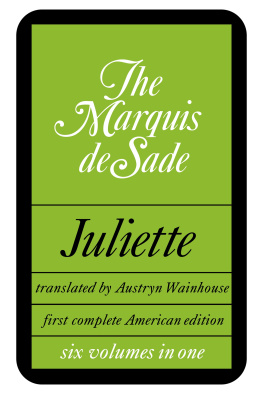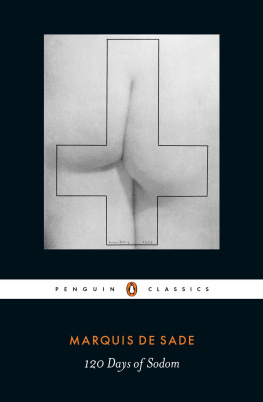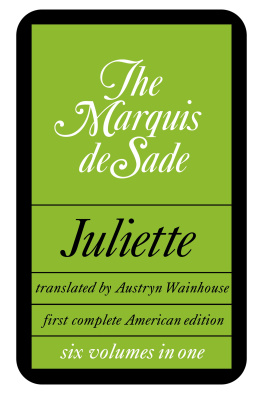Marquis de Sade - Juliette
Here you can read online Marquis de Sade - Juliette full text of the book (entire story) in english for free. Download pdf and epub, get meaning, cover and reviews about this ebook. year: 1994, publisher: Grove Press, genre: Humor. Description of the work, (preface) as well as reviews are available. Best literature library LitArk.com created for fans of good reading and offers a wide selection of genres:
Romance novel
Science fiction
Adventure
Detective
Science
History
Home and family
Prose
Art
Politics
Computer
Non-fiction
Religion
Business
Children
Humor
Choose a favorite category and find really read worthwhile books. Enjoy immersion in the world of imagination, feel the emotions of the characters or learn something new for yourself, make an fascinating discovery.
- Book:Juliette
- Author:
- Publisher:Grove Press
- Genre:
- Year:1994
- Rating:3 / 5
- Favourites:Add to favourites
- Your mark:
- 60
- 1
- 2
- 3
- 4
- 5
Juliette: summary, description and annotation
We offer to read an annotation, description, summary or preface (depends on what the author of the book "Juliette" wrote himself). If you haven't found the necessary information about the book — write in the comments, we will try to find it.
Juliette — read online for free the complete book (whole text) full work
Below is the text of the book, divided by pages. System saving the place of the last page read, allows you to conveniently read the book "Juliette" online for free, without having to search again every time where you left off. Put a bookmark, and you can go to the page where you finished reading at any time.
Font size:
Interval:
Bookmark:
THE MARQUIS DE SADE
TRANSLATED BY
AUSTRYN WAINHOUSE
COMPLETE AMERICAN EDITION
SIX VOLUMES IN ONE
Copyright 1968 by Austryn Wainhouse
All rights reserved. No part of this book may be reproduced in any form or by any electronic or mechanical means, or the facilitation thereof, including information storage and retrieval systems, without permission in writing from the publisher, except by a reviewer, who may quote brief passages in a review. Any members of educational institutions wishing to photocopy part or all of the work for classroom use, or publishers who would like to obtain permission to include the work in an anthology, should send their inquiries to Grove/Atlantic, Inc., 841 Broadway, New York, NY 10003.
Grove Press
an imprint of Grove/Atlantic, Inc.
841 Broadway
New York, NY 10003
Distributed by Publishers Group West
www.groveatlantic.com
To the final version of Justineand there are three versions of JustineSade added, as its complement and to complete it, The Story of Juliette; the two panels of a diptych, interrelated and yet distinct, they were first published in the year 1797 as an immense book called La Nouvelle Justine. The bibliographical details are these:
La Nouvelle Justine, ou les Malheurs de la Vertu. Ouvrage orn dun frontispice et de quarante sujets gravs avec soin. En Hollande [Paris], 1797. Four volumes, 18mo. These four volumes comprise the first part of the definitive edition of this work, of which the second part, in six volumes, bears the title: La Nouvelle Justine, ou les Malheurs de la Vertu, suivie de lHistoire de Juliette, sa soeur [ou les Prosprits du vice]. Ouvrage orn dun frontispice et de cent sujets gravs avec soin. En Hollande [Paris,] 1797.
As for the preceding redactions, the earliest and shortest, Les Infortunes de la Vertu, whose manuscript shows the date 1787, was designed for inclusion in a volume of those contes, historiettes, and fabliaux, carefully made, inoffensive, and eminently regular writings to which Sade attached a special importance. For it was through his public performancesfirst as a storyteller, later as a playwrightthat, as he rightly felt, he belonged to the world of letters. At the same time, and ever more so as he passed his prisoners time, along with his literary ambitions he nourished others, totally irregular, engendered by a rage no ordinary consolations could appease, and that rendered him the mortal enemy of the world outside. He wrote Les Infortunes de la Vertu in the Bastille. He was still there the next year when, seeing further into his theme, he began those variations and expansions upon which he was to remain embarked for a decade.
Justine, ou les Malheurs de la Vertu, printed in 1791, enlarges upon the philosophical tale without departing from its conventional expression. However, the increased violence of her experience is transforming the central figure: she is turning into something that neither the postulates nor the language of eighteenth-century common sense or right reason can securely fix. In her resistance to things as they are, in her incorrigible unwillingness or her inability to learn the lessons of the world, her mysterious absence in a world ruled by laws of wickedness, where only crime pays, where there are only weak and strong, only victims and tyrants, the latter always right and the former wrong perforcein this, the given and the possible world, Justines virtue is unreasonable and unreasoning: It is not miscalculation, it is aberration. Her tormentors, with logic and lucidity on their side, consider her perverse, mad. But they do more than consider her; she is of enduring interest to them, they are fascinated by her; in the unhappy girls nature they encounter something irreducible, something insurgent and unconquerable. And, well considered, that something is hardly less awesome, it is even more troubling than all the barbarities she undergoes.
Again rewritten, the dialectic of the earlier versions now reinforced through presentation in two stories, the scenes, the discourses multiplied, the whole invaded by excess and now in ten volumes and four thousand pages long, it is a masterpiece that appears in 1797, a work beyond which no other writer, at any time, has ever managed to venture; we have, so to speak, a veritable absolute in our hands, in this relative world of letters *
* Maurice Blanchot, Sade, in the introductory section to The Marquis de Sade: The Complete Justine, Philosophy in the Bedroom, and Other Writings. New York, Grove Press, 1965.
La Nouvelle Justine has been outlawed in France for the past one hundred seventy years. Since the Directory no French government has shown itself delinquent in regard to Sade. Like all its predecessors, the Fifth Republic has discharged its duty. The law must of necessity respect crime.
It was committed anew, La Nouvelle Justine was reprinted and circulated clandestinely under the Third Republic and read, but read, be it understood, by the rare readers of-rare books who in Sade beheld everything they for the most part were not, a rageur they could approach, could savor and admire in safety, protected by the implicit belief that the positions Sade assailed were invulnerable. Of those positions not one seemed anything like secure when, under the Fourth Republic, in 1949, LHistoire de Juliette was reissued in an edition which, while not clandestine, was hardly very public, being limited to 475 copies sold with utmost discretion and at a dear price. Nonetheless, and although the authorities were slow to move, the rules of the game had to be complied with in the end, and the publisher was prosecuted by the regime through the intermediary of La Commission du Livre and on January 10, 1957, found guilty of outrage to public morals.
On the question of public morals, on the question of in what sensein what final sensethey are outraged by Juliette, and on the question of the final sensethe outrageous and revolutionary senseof Juliette, it would be advantageous to reproduce a few lines, written over half a century ago, in which Apollinaire, with his sure intuition, exactly grasps what is at issue in Sades novel. The passage is quoted in the prefatory note to the 1949 Pauvert edition, and deserves to be inserted in this first American edition.
The Marquis de Sade, that freest of spirits to have lived so far, had ideas of his own on the subject of woman: he wanted her to be as free as man. Out of these ideasthey will come through some daygrew a dual novel, Justine and Juliette. It was not by accident the Marquis chose heroines and not heroes. Justine is woman as she has been hitherto, enslaved, miserable and less than human; her opposite, Juliette represents the woman whose advent he anticipated, a figure of whom minds have as yet no conception, who is arising out of mankind, who shall have wings, and who shall renew the world.
Ten years ago, the publishing of Sade in the United States seemed impracticable, seemed practically unthinkable; it was a project to wait and think about. The present translation was begun in September of 1956, and not finished until September of 1966. Signed by a Pieralessandro Casavini, most of itto be precise, the first five of what were to be seven volumes in allwas brought out in Paris over the years 19581961. That translation has been reviewed throughout, revised here and there; what remained incomplete has been completed; and altered circumstances have appeared to authorize the abandoning of a pseudonym.
Circumstances aside, the Sade I have frequented is a revolutionary, and his importance, in my eyes, is associated with revolutionary perspectives. Let me try to specify which ones.
Font size:
Interval:
Bookmark:
Similar books «Juliette»
Look at similar books to Juliette. We have selected literature similar in name and meaning in the hope of providing readers with more options to find new, interesting, not yet read works.
Discussion, reviews of the book Juliette and just readers' own opinions. Leave your comments, write what you think about the work, its meaning or the main characters. Specify what exactly you liked and what you didn't like, and why you think so.














